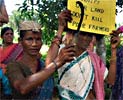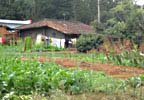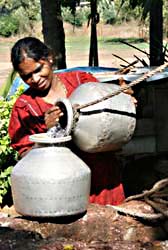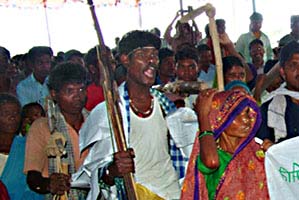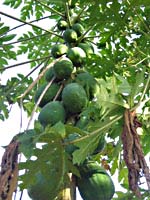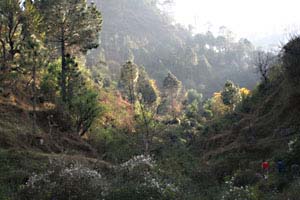"As long as the land is not given back, there will be no peace"
Heavy Resistance Adivasis Against Globalisation
A photo article of Joop Landman
The economy of India grows incredibly fast the last years. Even in our times of worldwide financial and economic crisis it still
goes strong, be it a little less. Still there are some drawbacks. Big companies got much more freedom to do what they want. They displace
small scale farmers and even expel Adivasis, the original peoples of India, from the regions protected earlier. But the resistance grows
from day to day. The farmers realize they will lose everything when their land has gone. Agriculture journalist Joop Landman visited villages
in all quarters of the vast country. (2009)
East
map Just across the fields there is a big wall in the Eastern-Indian village Singur in the state of
West Bengal. Behind the wall the land is in hands
of the Indian multinational Tata. There are several factory halls build, where Tata would produce its world famous mini car 'Nana'. But the car doesn't
come from Singur. Tata has decided to leave the village. The factory hall will be dismantled. The farmers reclaim their lands, they sold under heavy
pressure of the government, or which are expropriated with violence.
Peaceful but well decided resistance of the villagers, especially of the women, forced the government to stop the police violence for the displacement. At
the next state elections it needs the votes of the small farmers and landless farm workers, who are angry about the industrialisation policy of the
government. Without help of the police and with the ongoing resistance of the villagers the arrogant Tata had to surrender.
Action leader Mahader Das: "Off course we need industry. But let they build factories on waste lands. The fields here are very, very fertile. We
have a lot of irrigation. We have two, three, on some places even four crops a year." By the experiences of other industry projects the villagers
didn't believe the nice promises of compensation and jobs. Landless peasants who hire some field informally of bigger farmers even don't have pattas
official property papers. Das: "These tenants suffer a huge loss. Despite they cultivate the land, they will get nothing from the government. The basis
of their existence has gone."
Das tells about the poverty of the small scale farmers who lost their fields already and the hunger of farm workers who lost a lot of work. About the
suicides of poor people who became desperate. And about the anger, which is still there.
"As long as the land is not given back, there will be no peace" is the conclusion of Monoranjan Malik. He just told the story of his daughter Tapurjee
who was mistreated, raped and killed two years ago. He has an unbelievable mild smile on his face. Despite she was not yet twenty years old, she was leading
the women in their resistance.
In the end, after a lot of pressure of the villagers, the murderers were arrested and just got a lifelong sentence. Silently Malina, the mother of
Tapurjee, joins her husband for a photo with the mourning picture of their daughter.
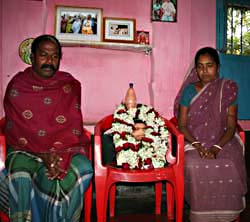 Monoranjan and Malina Malik with the photo of their daughter Tapurjee, the youthful action leader from Singur, who was killed December 2006, at the time
of this picture just two years ago.
Monoranjan and Malina Malik with the photo of their daughter Tapurjee, the youthful action leader from Singur, who was killed December 2006, at the time
of this picture just two years ago.
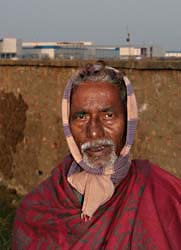 Ajit Maitra from Singur in front of the big wall of the Tata area. At the background the factory halls the company is dismantling now.
Ajit Maitra from Singur in front of the big wall of the Tata area. At the background the factory halls the company is dismantling now.
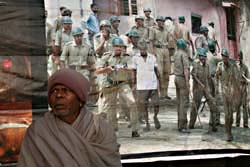 The police violence is remembered every year in Singur.
The police violence is remembered every year in Singur.
West
map Hundreds remote areas in India have become 'wild life reserves'. For example, there are 28 tiger reserves alone. Tourists from India and abroad like the parks. They bring a lot of money to these poor areas. But unfortunately it doesn't reach the poor people. They don't get a better life. Contrarily. The indigenous peoples, which are living already for generations in these forests and dry prairies, have to leave. On the pretext not to disturb the rare wild animals. But in fact to make place for luxury hotels, roads and watch-towers from and for the rich. This is even more bitter for small scale farmers who changed some pieces of bone dry land in a green paradise as if by magic.
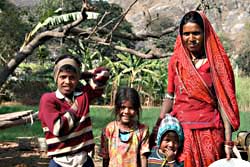 Family in the dry south of Rajasthan in front of their luxuriant green field. They irrigate it with the help of their bullocks. Now they have
to leave for a wild life project.
Family in the dry south of Rajasthan in front of their luxuriant green field. They irrigate it with the help of their bullocks. Now they have
to leave for a wild life project.
South
map In the South-Indian state Tamil Nadu alone the National Highway Authority of India acquired or expropriated more than three thousand hectares for expensive high ways the last three years. The coming years it will grab another five thousand hectares. The government finances the modernising and extension of the Indian network of high ways with World Bank loans, which prescribes it has to be toll-roads. For the poor the bus tickets will become more expensive and everything what has to brought to the cities and villages by trucks.
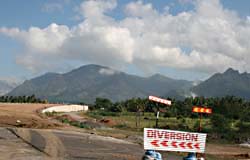 With help of World Bank loans the Indian government modernises the high way network. Like here in the Southern state of Tamil Nadu.
With help of World Bank loans the Indian government modernises the high way network. Like here in the Southern state of Tamil Nadu.
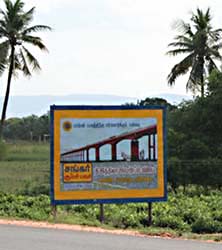 Countless bridges and fly-overs are under construction. To repay the loans the ways will become toll-roads.
Countless bridges and fly-overs are under construction. To repay the loans the ways will become toll-roads.
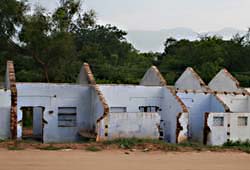 A lot of villagers had to leave their homes ...
A lot of villagers had to leave their homes ...
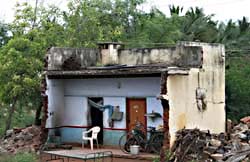 ... others 'live' in the ruins.
... others 'live' in the ruins.
South West
map The Kudubis resist against expropriation with all the power they have. Several generations back this indigenous people settled near the South Western Indian port Mangalore. It left hunting and switched to agriculture. They grow a lot of vegetables, which they sell in the city. When the oil refinery in the neighbourhood wanted to buy land for extension, they decided not to sell their land for whatever price. The company promised jobs, money and new houses. But even the illiterate Kudubis know already that these are empty promises. Activists from the city and Hindu priests support the Kudubis in their fight against the government and the company. To break the stalemate, the government dumped hundreds truckloads of mud on the fields of the Kudubis and started construction of villas. The Kudubis are desperate and furious.
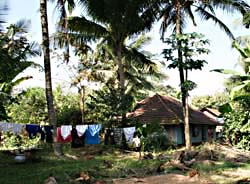 The Kudubi hamlet Padavu near Mangalore in Karnataka, South West India.
The Kudubi hamlet Padavu near Mangalore in Karnataka, South West India.
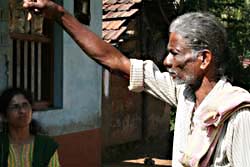 Kudubi action leader Malapa Gowda tells an activist from the city how trucks came early morning to destroy their fields.
Kudubi action leader Malapa Gowda tells an activist from the city how trucks came early morning to destroy their fields.
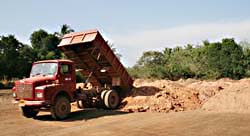 Hundreds of truckloads of mud the government dumped on the fertile fields of the Kudubis, to break their resistance.
Hundreds of truckloads of mud the government dumped on the fertile fields of the Kudubis, to break their resistance.
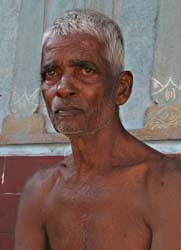 Lingappa Gowda, brother of Malapa and snake god priest.
Lingappa Gowda, brother of Malapa and snake god priest.
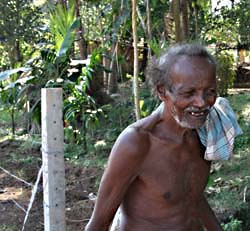 Neighbour of Malapa and Lingappa. His land is fenced now.
Neighbour of Malapa and Lingappa. His land is fenced now.
Center
map Ten years ago there were beautiful leafy forests here. Now it is just like the middle of the hell. We are in Tamnar in the Central Indian state
Chhattisgarh. The leaves of the trees and shrubs are black by a thick layer of sooty dust. You almost cannot breath here because of the air pollution. Huge
trucks thunder around on big roads. There are several chimneys with big clouds of smoke of the iron factories. Truckloads of black rubbish are dumped
just next the road everywhere. The small rivers are dammed and the water goes to the factories. The vegetables on the fields are so dirty, you can not
sell it on the market.
Still it is not enough. Even more forest has to be cut to bulldozer the coal; still more iron factories have to be build. But the Adivasis
(indigenous peoples) don't want it any more. They want fresh air, clean water and safe roads. Last year they made their claims on an official
environment hearing in their village. To teach them a lesson the police beat the villagers merciless at the end of the meeting. Several victims had
to go to the hospital.
But the violence worked in the other way. This year the villagers remembered the police violence with speeches of village leaders and activists, with
slogans, songs and swinging fists. In the night there was a commemoration with candles just at the place of the violence. With slogans again. Enough is
enough.
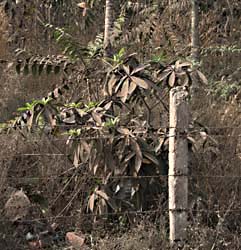 Ten years ago there was a beautiful forest here.
Ten years ago there was a beautiful forest here.
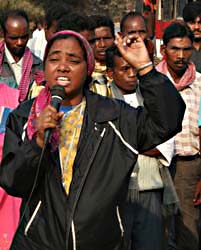 Bahan Bulu, an experienced Adivasi activist gives a speech.
Bahan Bulu, an experienced Adivasi activist gives a speech.
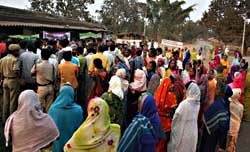 When the District Collector (highest official of the district) arrives, the Adivasi women came to him directly.
When the District Collector (highest official of the district) arrives, the Adivasi women came to him directly.
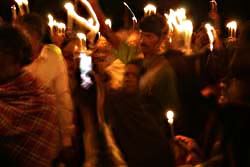 Just at the place where the police merciless hit the villagers people place candles and shout: 'Tamnar: Zindabad, Zindabad!', 'Long Live Tamnar!'
Just at the place where the police merciless hit the villagers people place candles and shout: 'Tamnar: Zindabad, Zindabad!', 'Long Live Tamnar!'
Go to next page: photo series about a gated community
Go to overview issues
